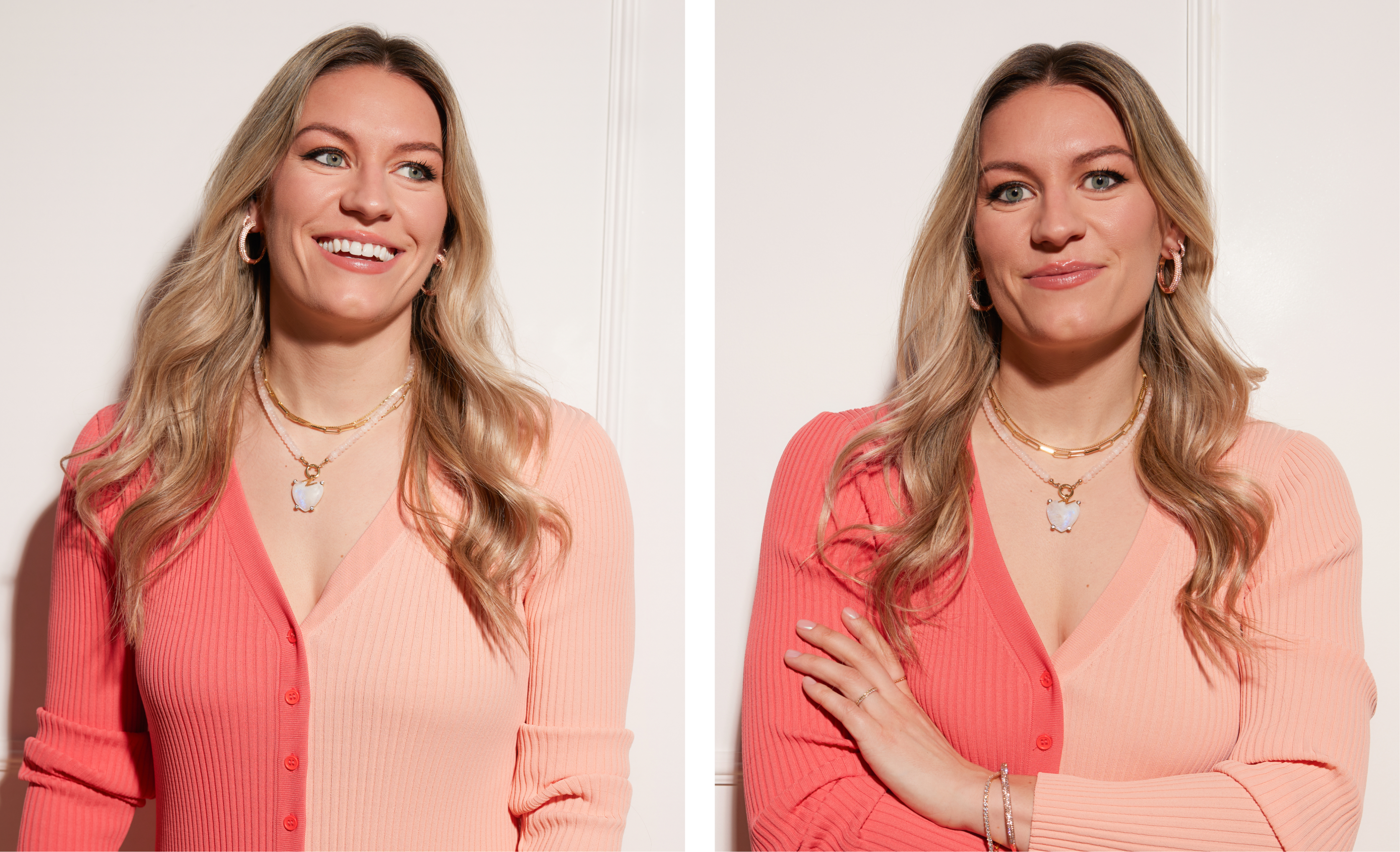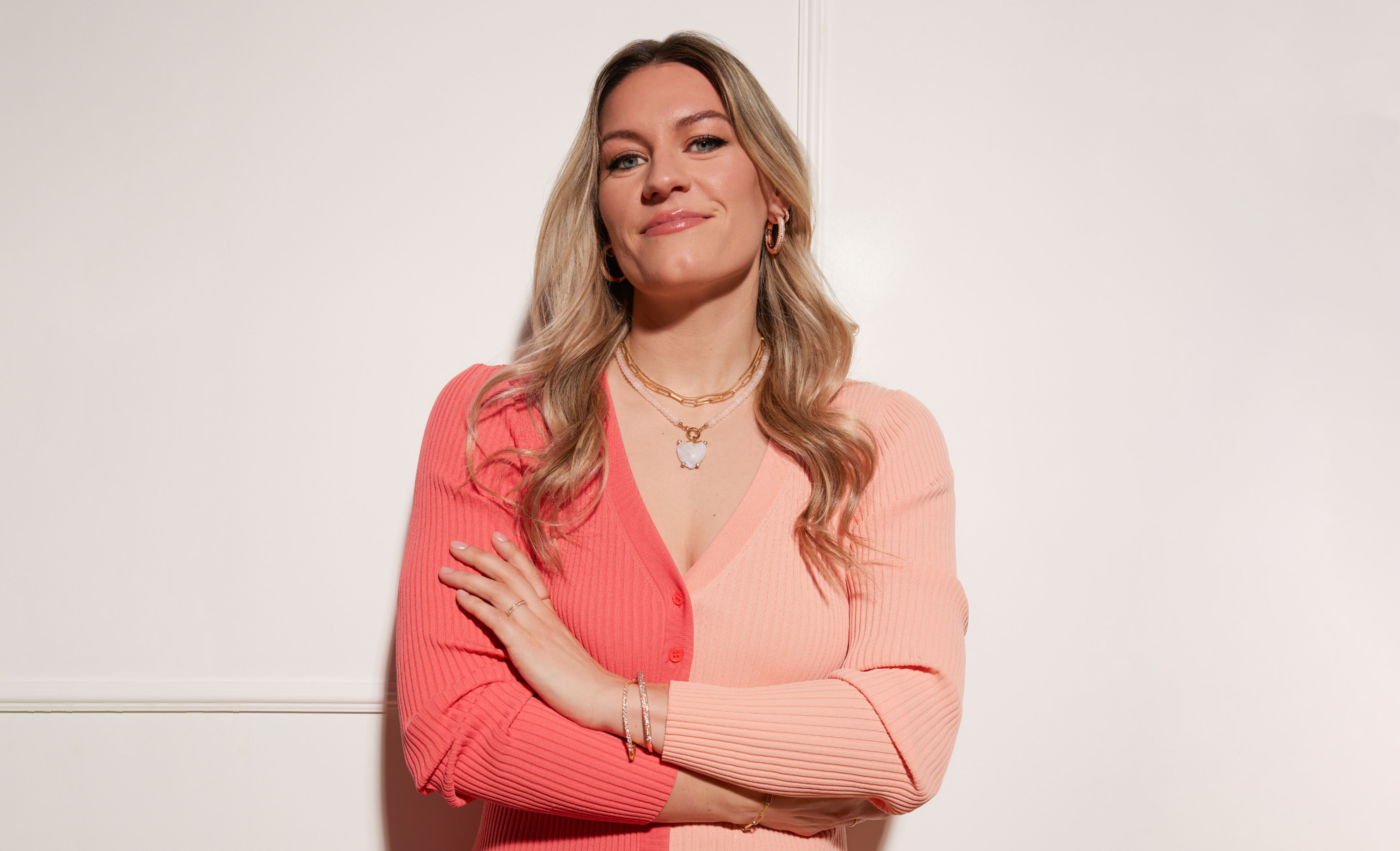
- Article published at:
Drawer menu
Natalie Spooner knows how to pump herself up. Whether it's telling herself she’s unstoppable or pumping breast milk for her baby in between periods of a professional hockey game, there doesn’t seem to be anything that can slow her down. It’s that kind of energy that makes her such a force on and off the ice and an integral part of helping get the PWHL to where it is now. Let’s get to know her.
Has hockey helped you affirm or realize any aspects of your identity or personality?
I started playing hockey at four years old so it's always been a part of my life, and it’s taught me a lot about hard work, perseverance, and dedication. I don't think I would be the person I am without this sport. A lot of my personality has probably come from the energy I get from the teammates I’ve always been surrounded by. The best thing about being on a team is how much fun you have with your teammates. I think that has played a big role in shaping who I am.
I started playing hockey at four years old so it's always been a part of my life, and it’s taught me a lot about hard work, perseverance, and dedication.
Why do you think it's important for women and girls to stay in sports?
Teamwork, dedication, hard work, and time management—there are so many skills you learn through sports that I think everyone uses in their daily lives. It's so important for girls to have those experiences. For me, sports were always a great release. I’ve always felt free on the ice and just had so much fun playing. There's a lot of stress in the world, so why not go out, play a game, and have a lot of fun?

Do you have any advice for young girls that are playing sports?
Believe in yourself. I think that that's the main thing. If I could go back, I would tell my little self to believe in myself and to know that you can achieve your dreams.
The other thing is that sports should be about having fun. I still remind myself every day to go back to thinking like that little girl who had so much fun playing hockey. That's what it's all about. So as long as you love what you're doing and having fun, it doesn’t feel like work. It's just fun.
What do you think the development of the PWHL means for young women and hockey in general?
It means a lot. Not only are we able to have a career playing hockey, but all of those little girls who watch us get to have the dream of playing professional women's hockey, just like any little boy would have.
Is there anything that you wish non-athletes realized about professional women's hockey?
I wish people knew more about all the amazing ladies that I get to play with and against. Before we had this professional league, there were ladies from all different walks of life: teachers, chiropractors, firefighters, police officers. Some women had full-time jobs and they would come and play hockey at night and be on the road all weekend.
This is the first year we’ve had a professional women's hockey league and we're able to make it into a career and have a salary. A lot of the ladies don't have to have side jobs or other careers now, and I think that’s amazing. It's going to help take women's hockey to the next level because everyone can focus on hockey and not have to worry about where their next paycheck is coming from.
This is the first year we’ve had a professional women's hockey league and we're able to make it into a career and have a salary.
What was your involvement in getting the PWHL started?
So in 2019, the CWL folded and we decided to come together, all the female hockey players, to create the PWHPA Players Association, and we ended up going on a Dream Gap tour. We played all across North America in all different rinks, and it was a great way to show there was a market for women's hockey.
From there we were lucky enough to get icons like Billie Jean King behind us. She’s one of the main people giving money. I don't think we could have gotten to where we are now without people like Billie Jean, Stan Kasten of the LA Dodgers, and Dana Halford. All of them really believed in the vision and we're just so lucky for their support.
What it was like to become a mother as a professional athlete?
It takes quite a bit of planning to start a family and then come back to sport. I had to time my pregnancy. So after the 2022 Beijing Olympics, we wanted to start a family, but I had set a goal I wanted to be back playing in the next world championships. Luckily, I got pregnant right away, and it all kind of went smoothly and I was able to achieve that goal. But it also meant that while I was playing hockey, I was still breastfeeding.

So you were playing at this high level while you were still breastfeeding? Can you tell us about that?
It was definitely a challenge. The time commitment that breastfeeding takes was one of the things that surprised me most about being a mom. I was able to bring him with me to most of the places I went because my mom would come along, too. But being away from him for games and practices, I had to get really good at being able to pump in the locker room or between periods. I had some pretty discrete pumps that I could just slip on in the locker room with the girls. I thought it was super funny when my teammates would look over and I’d be there pumping, and then either sending milk up or putting it in the fridge for after the game.
When you're a high-performance athlete, you're trying to power through and so forth. Maintaining your milk and making sure you're drinking enough and eating enough was a struggle. During the world championships, we were in some pretty intense games. So that was hard, but I was able to make it through.
Being away from [my son] for games and practices, I had to get really good at being able to pump in the locker room or between periods.
You were back playing hockey four months after you gave birth. What are some of the things that you didn't anticipate would impact your career as a professional athlete?
I came back four months postpartum to play my first hockey game in the PWHPA to give myself a chance to get ready for the World Championships, which were around the five-month mark. There were so many unknowns going into pregnancy and training afterwards. I don't think I realized how much my body changed because it happened so slowly.
I came back four months postpartum to play my first hockey game in the PWHPA to give myself a chance to get ready for the World Championships.
You kept skating until you were 36 weeks pregnant—what was that like?
I just loved getting out on the ice and I think the rink was where I felt the most normal, before and after giving birth. It felt like some type of normalcy to go out there and get back to being with my teammates. Life as a new mom can be quite isolating, so to have my teammates around me again was really freeing and so much fun. It made me feel like myself again.
How did you deal with the hunger, exhaustion, and sleep deprivation that pregnancy can cause?
So I found when I was breastfeeding, I was definitely eating way more every time I woke up in the night to feed. I also drank excessive amounts of water. Even when I was pregnant, I was so thirsty. I don't think I've felt that type of thirst before, but I just had to make sure I was eating whenever I was hungry and fueling my body.

Is there anything else you want to share about your experience becoming a mom and having a career as a professional athlete? Were there any emotional impacts or unexpected challenges?
When I became a mom, I did feel my priorities shift. Before, my whole life was built around hockey. And I would say I was a very selfish person in a sense. I was so committed to my training and that was really all that mattered. And then I had this baby that needed me and that I had to care for.
When I would have to go away for games and bring him with me, my mom would come, but I still felt this sense of guilt when I was leaving him to go on the ice. At the same time, I knew this was what I needed.
So there was some learning to do there and some new balances to find between my love for hockey and my love for my baby. My baby takes priority, but I was able to find a pretty good balance between being a mom and coming back to play the sport I love.
If you’re having a challenging time or need a confidence boost or something like that, are there any things you say to yourself?
I tell myself to be unstoppable, and I just picture myself being so dominant. I literally just tell myself “Be unstoppable.”
We noticed you like to play in your Sparkle Balls™ and other H&B jewelry. Why do you find yourself drawn to it?
I remember when I got my first pair of Sparkle Balls™, I just loved the way I felt in them. It’s the same way now with my pearl Sparkle Balls™—I just feel really good whenever I wear them. They're my go-to's, and I have to wear the biggest ones.
I remember when I got my first pair of Sparkle Balls™️, I just loved the way I felt in them.
Do you have any advice for women in general?
My advice for women would be to chase your dreams. No matter what. I can't say it's going to be easy. It's probably going to be difficult and there's going to be lots of twists and turns. But in the end, it's definitely worth it. You'll remember the journey more than the destination.
Chase your dreams. No matter what.
By: Carter Selinger